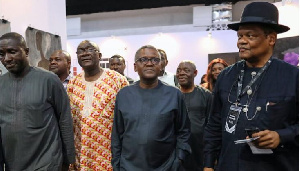The same names keep recurring — Dangote, Sawiris, Rabiu, Rebrab — but the rankings shift.
In the 2020 Forbes magazine’s ranking of Africa’s billionaires, Aliko Dangote ($10.1bn) remains number one. Overall, two big winners stand out, while several others see their fortunes — and rankings — seriously reduced.
The cumulative fortune of the continent’s billionaires, according to the latest Forbes ranking published on 17 January, represents $73.7bn. This is up from $68.7bn recorded a year ago. The growth is attributed mainly to the rise in share prices over the past year.
Although his wealth dropped slightly — down to $10.1bn from $10.3bn last year — Aliko Dangote stays on top as the richest person in Africa, a position he has held for the last nine years. The Nigerian tycoon, on the verge of multiplying his income fivefold by 2021, saw his wealth blunted by the drop in shares in Dangote Cement. The 62-year-old billionaire’s wealth was estimated at the same level in 2011, the first year in which he ranked among the richest in Africa but had more than doubled by 2014.
Next in line are Egypt’s Nassef Sawiris, with $8bn (up by $1.7bn from 2019) and telecom magnate Mike Adenuga, with $7.7bn (down by $1.5bn and by one place in the rankings from the previous year). In all, eight of the 20 billionaires saw their fortunes grow or fall by at least $700m.
Rabiu’s momentum continues slowly but surely
Nassef Sawiris may not have made number 1, but he’s the big winner in this year’s standings, up two places from 2019. This is the first time the Egyptian, brother of Naguib (in ninth place with $3bn), has won the silver medal in the ranking. Nassef Sawiris’ most profitable asset is a 5.7% stake in the Adidas sports brand, valued at just over $4bn. The increase in Adidas’ share price alone has added nearly $1.5bn to his fortunes since January 2019. Sawiris is mainly active in the construction and chemical sectors and has a significant stake in fertilizer producer Orascom Construction Industries (OCI NV), the construction division of Orascom, founded by his father, Onsi Sawiris.
Another big winner in the Forbes ranking is Nigerian Abdul Samad Rabiu, head of the conglomerate BUA Group (cement, sugar). Having made a comeback last year at $1.6bn, this year he weighs in at $3.1bn and moves up to eighth in the rankings.
Masiyiwa, big loser of the year
Zimbabwe’s only billionaire, Strive Masiyiwa, who built his fortune in telecoms, holds a stake in two local companies listed on the stock exchange. Zimbabwe’s decision in June 2019 to ban all foreign currencies and to use only the Zimbabwean dollar, however, accelerated inflation, causing the value of the newly established dollar to fall. For Masiyiwa, this meant a drop in his Econet Wireless Zimbabwe and Cassava Smartech holdings in US dollars. His fortunes fell to $1.1bn from $2.3bn a year ago.
Rebrab hit but not sunk
Cevital CEO Issad Rebrab, despite some shaky political dealings in 2019 and his imprisonment for eight months in connection with investigations opened against several Algerian businessmen linked to former President Abdelaziz Bouteflika, managed to remain in sixth place, with some $4.4bn. The Algerian boss saw his fortune reduced by $700m compared to 2019.
Will the other billionaire in the ranking, also the target of various lawsuits, Isabel dos Santos follow the same route? One of only two women in the rankings, alongside the Nigerian Folorunsho Alakija (20th; $1bn), the daughter of former president Jose Eduardo dos Santos, is ranked 13th with a fortune worth $2.2bn. In 2019, she was tied for 8th place with $2.3 billion.
Source: theafricareport.com
 Home Of Ghana News Ghana News, Entertainment And More
Home Of Ghana News Ghana News, Entertainment And More





